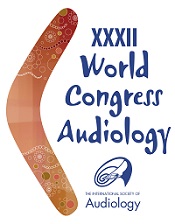 4 May 2014 – This week, international hearing experts at the XXXII World Congress of Audiology in Brisbane will discuss ways to offset a predicted increase in noise-induced hearing loss and tinnitus through increasing recreational and occupational noise exposure.
4 May 2014 – This week, international hearing experts at the XXXII World Congress of Audiology in Brisbane will discuss ways to offset a predicted increase in noise-induced hearing loss and tinnitus through increasing recreational and occupational noise exposure.
Living in a Noisy World Roundtable Convenor Dr Thais C. Morata (US National Institute for Occupational Safety and Health, from the Centres for Disease Control and Prevention) said our increase in noise exposure is caused by the world undergoing the fastest phase of growth and urbanisation in human history.
“The ears of many people worldwide are at greater risk of acquiring tinnitus or hearing loss due to an increase in the amount and intensity of sounds around us and Australia is no exception. A large proportion of these dangerous sounds are enjoyed and sought after by people through leisure activities such as nightclubbing and listening to portable music players,” Dr Morata explained.
“With the increasing size of our cities and mega cities, we have a greater exposure to environmental noise, so our ears rarely get a break. This is not a good thing. The World Health Organisation’s 2011
Burden of Disease From Environmental Noise Report has linked increased noise exposure to cardiovascular disease, cognitive impairment, sleep disturbance, hearing loss and tinnitus.”
There are some who suggest that as a response to the prevalent noise, and with new gadgets, more and more people use music from personal players to escape from the environmental noise of the city.
Dr Morata believes the messages hearing health experts should be sending is to enjoy music or loud sports events in ways that are safe so their hearing abilities remains healthy.
“This could be done in much the same way that most people managing their exposure to direct sunlight
– by providing access to good information to help people make informed choices,” Dr Morata stated.
Outside what can be controlled through occupational health and safety regulations, finding ways to reduce the adverse health effects of increasing environmental noise exposure is a real challenge for hearing health experts.
“At the Living in a Noisy World Roundtable, experts will present the latest on the different arenas and scenarios when noise is an issue and approaches to address it, recent developments in understanding the risk and approaches to detect any early effects will be discussed,” Dr Morata said.
“Approaches to provide information to the public through new media and new technologies such as smartphones apps will also be a talking point at the Roundtable.”
About the XXXII World Congress of Audiology host organisations
Audiology Australia: Australia’s largest member-based organisation representing professional audiologists and providing clinical certification and continuing professional development.
The HEARing CRC: An internationally unique consortium of research, clinical and industry organisations that undertakes clinical research and technological innovation to prevent and better manage hearing loss.
International Society of Audiology: A member-based organisation that facilitates a greater understanding of audiology and the sharing of knowledge to protect and rehabilitate human hearing through its highly regarded publication The International Journal of Audiology.

